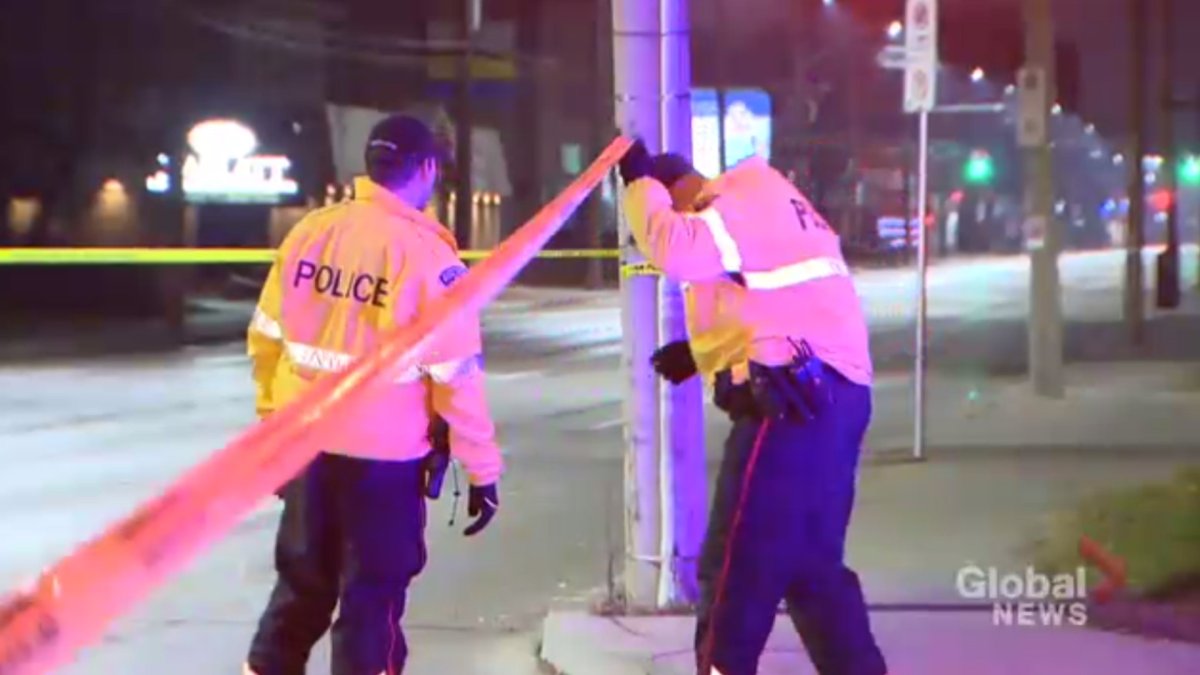Testimony from a police officer first on scene the night 19-year-old Yosif Al-Hasnawi was fatally shot in 2017 was highlight of day three in the trial of two paramedics accused failing to provide the necessaries of life.

Most of the questions Const. Michael Zezella fielded on Thursday concerned his actions on the night of the shooting and some of what one of the accused paramedics did the on Dec. 2, 2017.
Two former Hamilton paramedics — Steven Snively, 55, and Christopher Marchant, 32 — are each facing a charge of failing to properly care for the shooting victim.
On the stand, Zezella told the court that both police and paramedics took the shooting seriously and that he didn’t believe the victim was faking his injuries.
The comments came following an exchange with Crown attorney Scott Patterson who asked Zezella if he had uttered the phrase “acting like he had been shot by an AK-47,” on scene when he believed the victim may have only been shot by a pellet or BB gun.
Zezella said “no.”
Much of Zezella’s testimony was recounted during the playback of security video that captured his actions when he arrived scene at 581 Main Street East on the night of Dec. 2, 2017.
During his recollection, Zezella said he saw a crowd upon arrival and didn’t see the victim until he exited his cruiser and radioed in that he encountered a “male down.”
In his call to dispatch, Zezella said the injured man appeared to have superficial injuries to his abdomen and was possibly shot by a BB gun, as suggested by someone in the crowd surrounding Al-Hasnawi.

Zezella said he only remembered one paramedic on scene at the height of the incident on Dec. 2., a younger guy with a baseball cap on that he identified as Marchant.
He and Marchant had a “brief coversation” about Al-Hasnawi, with Zezella relaying that the victim hadn’t said anything, didn’t complain of any pain, and had no reaction when he touched him.
After the two were unable to get Al-Hasnawi to sit up, Zezella remembers bystanders coming to their aid and pulling Al-Hasnawi up off the ground.
“One of the friends or a couple of people that were present in that group got in between, lifted the victim up and started to almost pick him up off the ground and start heading towards the stretcher,” Zezella responded to Patterson.
- Gas station clerk stabbed several times during violent attack at Ultramar in Montreal
- Canada’s most wanted list: Toronto suspect in fatal shooting at No. 1
- Man acquitted in Tina Fontaine murder found dead, says her aunt
- Canadians should expect politicians to support right to bail, Virani’s office says
Not long after, the officer would make contact with the Al-Hasnawi’s father at the scene and begin asking routine questions about the victim and “does he typically act this way.”
Zezella said he either said “no” or “I don’t know” to which the officer then proceeded to ask him to talk to his son and tell him “he’s going to be okay.”
Later in a cross-examination, defence attorney Jeff Manishen asked Zezella about his knowledge of injuries and superficial wounds, to which the officer said he hadn’t received any type of training in regards to internal injuries and didn’t have a way to assess the depth of the wound.
At one point in the proceedings, Zezella was also asked by Patterson if he had any recollection of “waving off” firefighters upon their arrival to the scene and why they didn’t treat the victim.
Zezella responded by saying “no” and “I have no idea” to the questions.
Earlier, before Zezella took the stand, Crown attorney Linda Shin asked captain Mark Stevens, one of the firefighters on scene that night, why they didn’t do a “head to toe” examination of the victim and opted to follow “the direction of the police officer to stop?”
Stevens told the court he was “trying to obey the police officers on scene.”
Day four of the trial will resume on the morning of Monday, Nov. 30 with Al-Hasnawi’s father is expected to take the stand.
Over the next five weeks, Justice Harrison Arrell is expected to hear testimony from numerous witnesses, including emergency responders, Al-Hasnawi’s family, and bystanders who witnessed the teenager’s final moments.




Comments